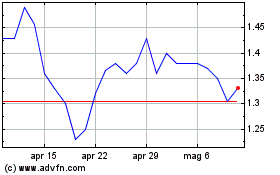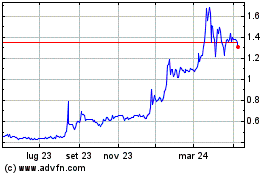Appeals Court Rules In GSE Case But Not That GSE Case
19 Agosto 2016 - 4:30AM
Dow Jones News
A federal appeals court finally issued a decision in a
long-running dispute over actions taken by the U.S. government
after it put Fannie Mae and Freddie Mac into conservatorship in
September 2008.
It wasn't, however, the decision that many investors,
housing-policy wonks and the government have been eagerly awaiting.
That decision, reviewing a federal judge's dismissal of a case
brought by Fannie and Freddie shareholders protesting the
government's claim on profits, will come out of the U.S. Court of
Appeals for the D.C. Circuit.
Thursday's decision came from the U.S. Court of Appeals for the
Federal Circuit, the other group of federal courts based in the
District of Columbia. It wasn't brought by shareholders protesting
the government's claim on Fannie's and Freddie's profits, it was
brought by the former chief financial officer of Freddie Mac.
Still, Investors Unite, a group that advocates for Fannie and
Freddie shareholders, described the decision as a "positive sign"
in a tweet.
That's half-right. There certainly are parts of the ruling that
may benefit shareholders. But there are other parts that may hurt
them.
The case decided Thursday was brought by Anthony Piszel, who was
named Freddie's CFO in 2006. His contract said that if he was fired
from the position without cause, he would get a severance package
that would include a lump-sum payment equal to twice his annual
salary and that his restricted stock units would continue to
vest.
Shortly after Freddie was seized by the government, Mr. Piszel
was fired at the behest of the director of the Federal Housing
Finance Agency, which had become Freddie's conservator. The
director also determined that Freddie shouldn't pay Mr. Piszel any
severance payment.
Mr. Piszel sued in the U.S. Court of Federal Claims six years
later, arguing that the cancellation of his severance payment was a
taking by the government. Under the Fifth Amendment's "takings
clause," the government must provide compensation when it deprives
someone of property.
Last summer, a federal judge dismissed Mr. Piszel's case. Citing
earlier cases in which federal courts held that shareholders of
failed banks lacked property interests that could give rise to a
takings claim, the judge ruled that Mr. Piszel's contract didn't
create a property right for which he could demand compensation.
The judge said by signing a contract with a company as
pervasively regulated as Freddie Mac, Mr. Piszel had assumed the
risk that future regulation might change or eliminate benefits or
compensation promised to him. That argument had been used to turn
away suits by bank shareholders after the lenders were seized by
the Federal Deposit Insurance Co.
Even though it ultimately agreed with the dismissal, the appeals
court disagreed with the argument. It said that Mr. Piszel's
contract did create a property right. The court pointed out that
the law that authorized the FHFA to bar a severance payment to Mr.
Piszel wasn't passed until the summer of 2008, after he had entered
into the contract with Freddie. This is the part that is good news
for Fannie and Freddie shareholders: Some of the lawsuits also make
claims based on the takings clause. After this ruling, it is more
likely that federal judges in those cases will hold that they also
have property rights arising from ownership of shares.
But they shouldn't get too giddy. Keep in mind that the appeals
court upheld the dismissal. It ruled that while Mr. Piszel's
contract really did create a property right, nothing the government
did took that right away from him.
That needs a bit more explanation. After all, the FHFA really
did tell Freddie to fire Mr. Piszel and not to pay any severance.
And Freddie did both those things. By Mr. Piszel's reckoning, the
severance package would have been valued at $7 million. How could
the government deny him that without taking anything from him?
The court ruled that the FHFA's instructions didn't take
anything from Mr. Piszel because he still had the right to enforce
his contract in a breach-of-contract lawsuit against Freddie Mac.
Although he wouldn't have been able to force Freddie to live up to
the contract, he could have sued for damages equal to the value of
the promised severance. And since he still had that right to sue
for breach of contract, he still had the property interest created
by the contract.
This is a particularly tough line of reasoning for Mr. Piszel
because the statute of limitations on breach-of-contract claims ran
out years ago. So the appeals court is telling him that he brought
the wrong kind of case to the wrong court at the wrong time.
It may also be bad news for shareholders, at least those hoping
for a win on the takings claims.
Many of the investor lawsuits also make breach-of-contract
claims. Holders of preferred shares of Fannie and Freddie argue
that the government's claim to all of the profits of the companies
denies them contractual rights to dividends and specified
liquidation preferences. Common shareholders also claim their
rights to dividends and to the residual value of the company has
been violated.
Under the logic of the appeals court in Mr. Piszel's case, if
shareholders have the right to sue for breach of contract, there
may not have been a taking at all. Sure, all the value of the
companies now accrues to the government but if shareholders can sue
for breach of contract, the government arguably hasn't taken
anything from them.This isn't necessarily awful news for
shareholders. It doesn't foreclose all chances of a legal victory,
but it may mean that their takings claims will get dismissed. That
is a setback because many of the investors believe that this was
their best line of legal argument.
Write to John Carney at john.carney@wsj.com
(END) Dow Jones Newswires
August 18, 2016 22:15 ET (02:15 GMT)
Copyright (c) 2016 Dow Jones & Company, Inc.
Grafico Azioni Federal Home Loan Mortgage (QB) (USOTC:FMCC)
Storico
Da Mar 2024 a Apr 2024

Grafico Azioni Federal Home Loan Mortgage (QB) (USOTC:FMCC)
Storico
Da Apr 2023 a Apr 2024
